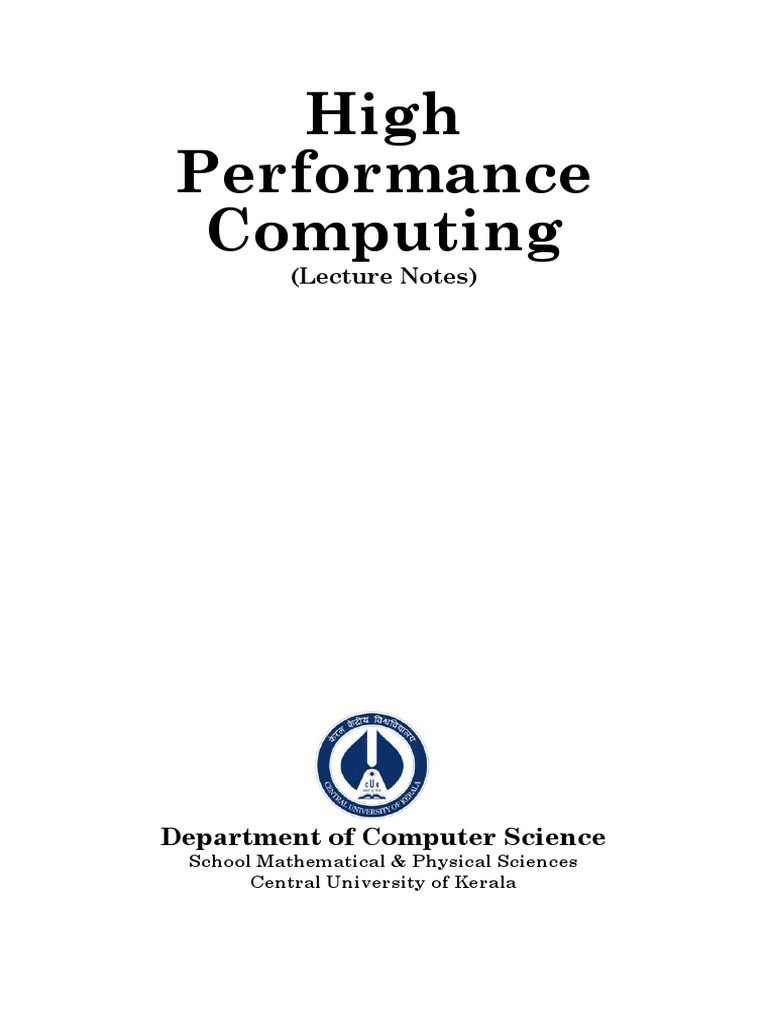High Performance Computing (HPC) represents a fascinating intersection of technology, mathematics, and engineering, illuminating pathways toward solving the most complex problems of our time. As researchers and industry professionals increasingly rely on sophisticated computational power, the written word has become an essential medium through which knowledge and innovation flow. This article delves into a curated selection of seminal texts that encapsulate the essence of HPC, providing insights into its theoretical foundations, practical applications, and ongoing evolution.
The complexity of High Performance Computing can often leave one mesmerized, as it embodies an intricate tapestry of algorithms, architectures, and applications. The allure lies not merely in its incredible computational capabilities, but also in its transformative potential. The following texts serve as pivotal resources for those intrigued by the nuances of HPC, whether for academic study or professional engagement.
1. “Positive Feedback: Control Theory in Scientific Computing” by Greg Erdmann
This work offers a comprehensive exploration of control theory within the context of scientific computing. Erdmann elucidates sophisticated concepts that underpin stability and performance in HPC systems. Through various practical examples and rigorous mathematical formulations, the author lays bare the elegant interplay between feedback mechanisms and computational efficiency. This book serves not only as an academic resource but also as a thought-provoking discussion starter on the adaptability and the future trajectory of control theory in modern computing.
2. “High Performance Computing: Modern Systems and Practices” by Thomas Sterling, Matthew Anderson, and Maciej Brodowicz
Sterling and his co-authors anchor this text in the unyielding principles of HPC while addressing modern advancements in parallel computing technology. The authors take readers on an intellectual journey through the architecture of contemporary HPC systems, performance optimization techniques, and the essential role of software tools. By marrying theoretical concepts with real-world case studies, this book vividly illustrates how performance can be maximized in diverse applications, from climate modeling to genomic research. It expands the reader’s comprehension of HPC and its broader impacts across disciplines.
3. “The Art of Computer Programming” by Donald Knuth
While not exclusively focused on HPC, Knuth’s magnum opus remains a cornerstone of computer science literature. Its meticulous treatment of algorithms serves as both a reference and technique guide for professionals seeking to optimize their computational routines. Knuth’s detailed analyses of efficiency and performance considerations provide critical context to the algorithms that power modern HPC applications. Readers often find themselves enchanted by Knuth’s prose, which transforms complex algorithmic designs into an approachable and engaging narrative.
4. “Introduction to High Performance Computing for Scientists and Engineers” by Geoffrey C. Fox, et al.
This textbook stands out as a user-friendly guide and reference for scientists and engineers venturing into the HPC domain. Its pedagogical approach breaks down complex concepts into digestible segments, making it accessible for novices while still offering depth for seasoned professionals. The authors emphasize the synergy between computational theory and practical implementation, exploring effective strategies for performance evaluation and benchmarking. Readers will find a wealth of insights into the opportunities and challenges of implementing HPC solutions in their own scientific work.
5. “Parallel Programming in C with MPI and OpenMP” by Quinn Michael J.
Quinn’s work is a vital resource for those looking to harness parallel programming paradigms to enhance processing efficiency. Focused on the Message Passing Interface (MPI) and Open Multi-Processing (OpenMP), this book provides a comprehensive foundation for executing parallel algorithms effectively. By combining theoretical exploration with practical implementation examples, readers gain valuable insight into the decision-making processes surrounding parallelization methods in HPC. The text invites readers to partake in a journey of computational exploration, revealing the hidden potential of their own applications.
6. “Scientific Computing: An Introductory Survey” by Michael T. Heath
This survey serves as both a primer and a deeper examination of scientific computing, placing a strong emphasis on numerical methods and their applications. Heath meticulously discusses the underlying mathematics that drive high-performance systems, ensuring that readers grasp the significance of computer algorithms in solving real-world problems. The text is laden with practical examples from diverse fields such as fluid dynamics and structural analysis, enticing readers to reflect on the mathematical beauty encapsulated within HPC solutions.
7. “High Performance Computing Using FPGAs” by Rainer P. W. H. Dorr
Dorr dives deep into the innovative applications of Field Programmable Gate Arrays (FPGAs) within HPC. This text elucidates how FPGAs can be leveraged to achieve unprecedented levels of performance and efficiency in computation-intensive tasks. The reader is guided through the intricacies of FPGA architecture, programming tools, and their application scenarios, making this work a pivotal resource for those interested in cutting-edge technology at the frontier of HPC.
Conclusion
The array of literature on High Performance Computing highlights the academic and practical imperatives of this multifaceted discipline. Each book provides invaluable insights and fosters a deeper appreciation of the field, addressing not just the hows but also the whys of high-performance solutions. As HPC continues to evolve with advancements in hardware and algorithms, these texts not only equip readers with essential knowledge, but also satiate their intellectual curiosity about this ever-expanding frontier. Engaging with these works opens the door to exciting possibilities, provoking reflection on the dynamic relationship between computational power and the resolution of complex global challenges.












